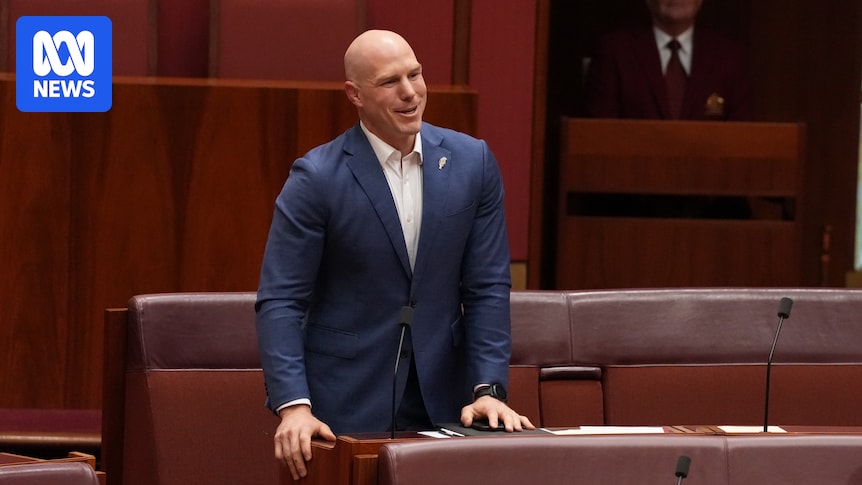Pauline Hanson is no stranger to shocking the Senate.
This time, however, there were no outfit reveals like her widely condemned burqa offering of 2017, but rather a surprise nomination for a man who, politically at least, sits at the opposite end of the spectrum.
“I would like to nominate David Pocock,” the One Nation leader said, putting forward the independent to be president of the Senate.
Perhaps what was more shocking was what followed — a man turning down the chance at a pay rise and political promotion.
“I am very flattered that you would put me forward,” a surprised Pocock told the chamber.
David Pocock declined the nomination to be President of the Senate. (ABC News: Ian Cutmore)
‘Politely decline the nomination’
Wearing a jacket and no tie, Pocock noted that as much as he disagreed with the bulk of the conventions in the Senate, this was an instance in which he would uphold it, and focus his time representing the people of the ACT.
“I would politely decline the nomination but thank you,” he said before returning to his seat on the crossbench.
The scale of Labor’s election victory brought with it gains in the Senate that will see the ALP become the biggest party. It also stripped Pocock of the key vote he previously held in the last parliament.
Having quietly returned to his seat, across the parliament, the father of the House was finding his voice, even if it wasn’t necessarily being sought.
Bob Katter stood alongside his fellow crossbenchers when he took his oath of office. (ABC News: BRENDAN ESPOSITO)
Allegiance to the Australian people
Bob Katter stood alongside his fellow crossbenchers as House of Representatives clerk Claressa Surtees asked the MPs to swear their allegiance to King Charles, his heirs and successors.
“No, I swear allegiance to the Australian people,” Katter said, before repeating it a second time.
Labor cabinet ministers Anika Wells, Clare O’Neil and Tanya Plibersek react to Bob Katter’s allegiance comments. (ABC News: BRENDAN ESPOSITO)
It was far from the first time a politician had gone off script.
In the last parliament, senator Lidia Thorpe initially described the Queen as a coloniser. At the time she was forced to recite the oath as written. Years later she would claim that she had sworn her allegiance to the Queen’s “hairs”, not “heirs”.
This time, no hairs were split over Katter’s comments and the pomp and circumstance carried on.
Still licking its wounds from its electoral drubbing, the Coalition broke with convention and opted against nominating a candidate for speaker, instead backing in Labor’s Milton Dick to return the role he held in the last parliament.
Steps were racked up as MPs marched backwards and forwards between the chambers for the ceremonial proceedings.
A different looking parliament
As Labor MPs crammed into the Senate, it hammered home the scale of its May election.
Squished into the limited seating of the 76-member Upper House, Labor’s 123 politicians were crammed in like sardines. The opposition, meanwhile, with its 70 politicians, had enough room to swing a cat.
It wasn’t just the numbers that told the story but also what those in the chamber were wearing.
Labor has close to double the number of Coalition politicians in the federal parliament. (ABC News: Ian Cutmore)
A seat of men in blue suits dominated the opposition’s benches, where fewer than one in three were women.
Opposite them sat a female-dominated Labor caucus, where the number of women is so strong that it is just one person shy of the full Coalition caucus.
In the House of Representatives it’s even starker, with Labor women making up greater numbers than the opposition as a whole.
The return of the parliament brings with it a chance for Labor to take not just a victory lap but the chance to rub it in the face of its opponents.
You need only look to who Labor tapped to deliver the first of the parliament’s first speeches to see an example of just that.
Ali France’s first speech
First up will be Ali France, followed then by Sarah Whitty, two women whose victories came at the expense of Liberal leader Peter Dutton and Greens leader Adam Bandt.
Defeating Dutton is why so many people know France’s name.
Defeating Peter Dutton is just one part of Ali France’s story. (ABC News: Ian Cutmore)
But her story is so much more than the man she defeated at an election.
A former journalist, para-athlete and disability advocate, France had a leg amputated above her knee after she was pinned by a car in a shopping centre car park.
Her eldest son, Henry, died from leukaemia in early 2024, an experience that almost prompted her to abandon her years’ long quest to become a federal MP.
In an arena that has long been dominated by men, France’s story shows how the parliament is changing.
Anthony Albanese and Sussan Ley will face off in question time for the first time tomorrow. (ABC News: Brendan Esposito)
Tomorrow too will bring with it those signs of change, when Sussan Ley squares off against the prime minister for her first question time as opposition leader.
The first woman to hold that role, Ley has vowed she’ll be doing business differently to the men who came before her.
Loading
